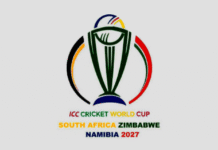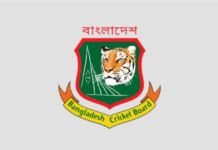
Bangladesh athletes participate in the march-past during the opening ceremony of 13th SA Games at Dashrath Stadium in Kathmandu on Sunday. — Courtesy photo
The 13th edition of the South Asian Games officially began its 10-day long journey with a glitzy opening ceremony, filled with pomp and grandeur, at the Dasarath Rangasala Stadium in Kathmandu, Nepal on Sunday.
The regional sporting carnival will see athletes from Nepal, Bangladesh, Bhutan, India, Maldives, Pakistan and Sri Lanka compete for glory in 26 different sporting disciplines, which will be held at three cities – Kathmandu, Pokhara and Janakpur.
The inauguration ceremony began at 5:15 pm Bangladesh Standard Time with the march-past by athletes which was followed by a cultural programme, showcasing the history and culture of Nepal in front of almost 15,000 spectators.
Nepal president Bidya Devi Bhandari announced the official opening of this year’s Games at 6:15 pm BST which was followed by fireworks.
Nepalese prime minister Khadga Prasad Sharma Oli, diplomats of the participating nations and a number of local and foreign dignitaries were also present at the ceremony.
Swimmer Mahfuza Khatun Shila, who bagged two gold medals for Bangladesh in the 2016 SA Games in India, carried Bangladesh’s national flag in the march past.
This is the third time Nepal are hosting the Games after hosting the inaugural edition in 1984 and the eighth edition in 1999.
This year a total of 462 athletes, 263 male and 199 female, from Bangladesh will take part in every discipline barring triathlon.
More than 2,000 athletes from the seven participating nations will compete for 1119 medals, including 319 gold, in this year’s Games.
Bangladesh’s most successful campaign in the SA Games was in 2010 at home, when they bagged 97 medals, 18 gold, 23 silver and 56 bronze, to finish third in the medal list.
This year Bangladesh will be hoping to top their previous best, with Afghanistan not participating and India withdrawing from 10 disciplines.
In 2016, Bangladesh finished fifth with 75 medals – four gold, 15 silver and 56 bronze medals.
Bangladesh Olympic Association secretary general Syed Shahed Reza was present at the opening ceremony and hoped that the organisers will run the main competition with the same efficiency as the inauguration programme after their initial late start in preparation for the mega event.
‘Actually, it takes time to arrange an event like this. They [Nepal] started it in a hurry. We visited here 15-day back and now we are observing that the condition is better than that time. Anyhow, as the games started, I think, they would be able to organise all games smoothly,’ said Shahed Reza to media.
Nepal government had to reconstruct most of the venues for the Games, including main venue Dasarath Stadium, after they were badly affected in the 2015 earthquake.
The biennial event was originally scheduled for March 2018 and the schedule differed for three times before at last it was fixed to be held from December 1 to 10 in 2019.
Source: New Age.









